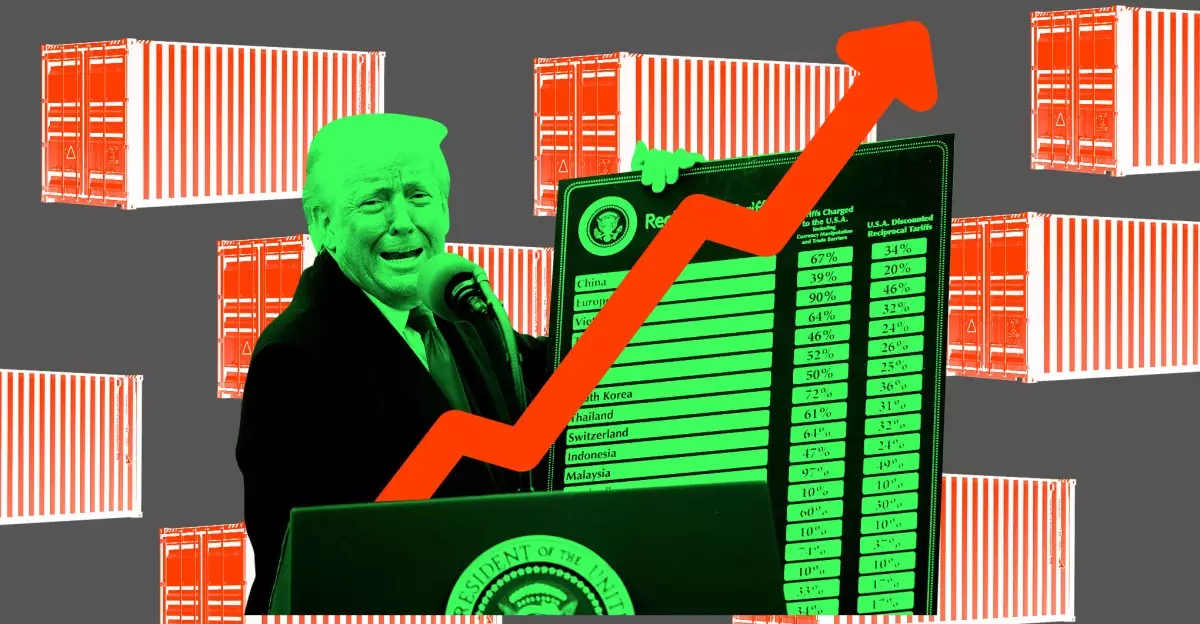The tech landscape in the United States has entered a tumultuous phase, as industry giants grapple with the complexities of international relations and trade wars. Once considered the darlings of a vibrant economy, companies like Meta, Apple, and Tesla now find themselves under increasing scrutiny and pressure as geopolitical tensions escalate. The shift in sentiment from the previous administration, which some hoped would bolster their interests, has left tech leaders like Mark Zuckerberg and Elon Musk feeling like pawns in a high-stakes game between governments.
Recent comments from European Commission President Ursula von der Leyen about potentially imposing levies on digital advertising revenues highlight how quickly the mood can shift. What once could have been perceived as a lifeline from an allegedly pro-business administration is now morphing into a scenario where these corporations are viewed as targets. The fine that the EU plans to impose on Meta for its alleged violations of the Digital Markets Act is a stark reminder of how these companies are caught in the crossfire of international diplomacy.
The Dwindling Fortunes of Tesla and Musk
Particularly acute is Tesla’s situation, as it contends with an almost existential crisis amid plunging stock prices—down over one-third this year alone. The narrative around Elon Musk is further complicated by his perceived alignment with nationalist sentiments, which some argue is adversely affecting the company’s reputation and viability. The imposition of tariffs has precipitated the discontinuation of US-made vehicle options in China, demonstrating how quickly the tides can turn. For consumers and investors alike, this relentless oscillation raises questions about the long-term sustainability of these tech giants in increasingly hostile economic climates.
The interplay between Musk’s personal brand and Tesla’s corporate identity cannot be overstated. If the narrative of Musk as an ally of Trump continues to solidify, it may alienate a significant portion of consumers who are increasingly concerned about the ethical implications of their purchasing decisions. The very ethos of innovation that Tech companies once stood for now seems vulnerable to the whims of international disputes.
TikTok: A Major Player, Yet in Jeopardy
The story of TikTok is equally fraught with peril, as it appears to be ensnared in a web of geopolitical maneuvering. As tensions rise over trade policies and tariffs concerning China, TikTok’s operations in the United States are increasingly being called into question. The upcoming deadlines for negotiations on its future are becoming less and less certain. Amid the murky waters, the company’s leadership faces mounting challenges and decreased clarity about what lies ahead.
Interestingly, China’s response to the proposed U.S. tariffs has been fierce, making it clear that they are unwilling to cede ground. This lack of dialogue combined with the uncertainty impacts the decision-making processes of potential buyers and partners. TikTok remains a vital player in digital advertising and social media, but the underlying tensions threaten to unravel its user base and business in one of its largest markets.
The Larger Implications for Big Tech
The reality is that the tech industry has ballooned in size and significance, transforming its leading companies into pawns of diplomatic leverage. In periods of stability, this influence can benefit these corporations massively; however, it becomes a double-edged sword in times of geopolitical discord. This paradox creates a sense of vulnerability among these once-prosperous players.
Moreover, as the United States grapples with the implications of its regulatory stances towards these companies, it also risks losing the innovation and entrepreneurial spirit that made them thrive in the first place. For industry insiders, the threat posed by increasing regulatory burdens may not only stymie growth but could also force companies to reconsider their global strategies and market approaches.
Internal Struggles and Layoffs: A Cloud Over Corporations
Compounding the external pressures are internal challenges such as layoffs, particularly within Google’s Platform and Devices division. Employees learned the harsh realities of corporate decisions that appear misaligned with the expectations set during previous voluntary options. The disparate treatment between those let go and those who opted for voluntary reductions raises questions about company culture and the value placed on employee well-being. In an era where tech companies are still celebrated for their seemingly limitless potential, such inconsistencies feel particularly jarring.
This sort of turbulence reflects a larger trend within the industry—the feeling that the tech sector is undergoing a maturation phase, where the initial exuberance of rapid growth is giving way to the sobering realities of market regulation, competition, and market corrections. Companies that once soared might find themselves mired in uncertainty if they cannot adapt quickly to the new world order emerging from regulatory pressures and geopolitical disputes.
As the repercussions of these dynamics unfold, industry players and interested observers alike would do well to keep a close watch on how the interplay between government, market forces, and corporate strategies continues to shape the future of tech. The stakes are undeniably high, and as digital tides shift, the repercussions could be felt far beyond the walls of Silicon Valley.


Leave a Reply